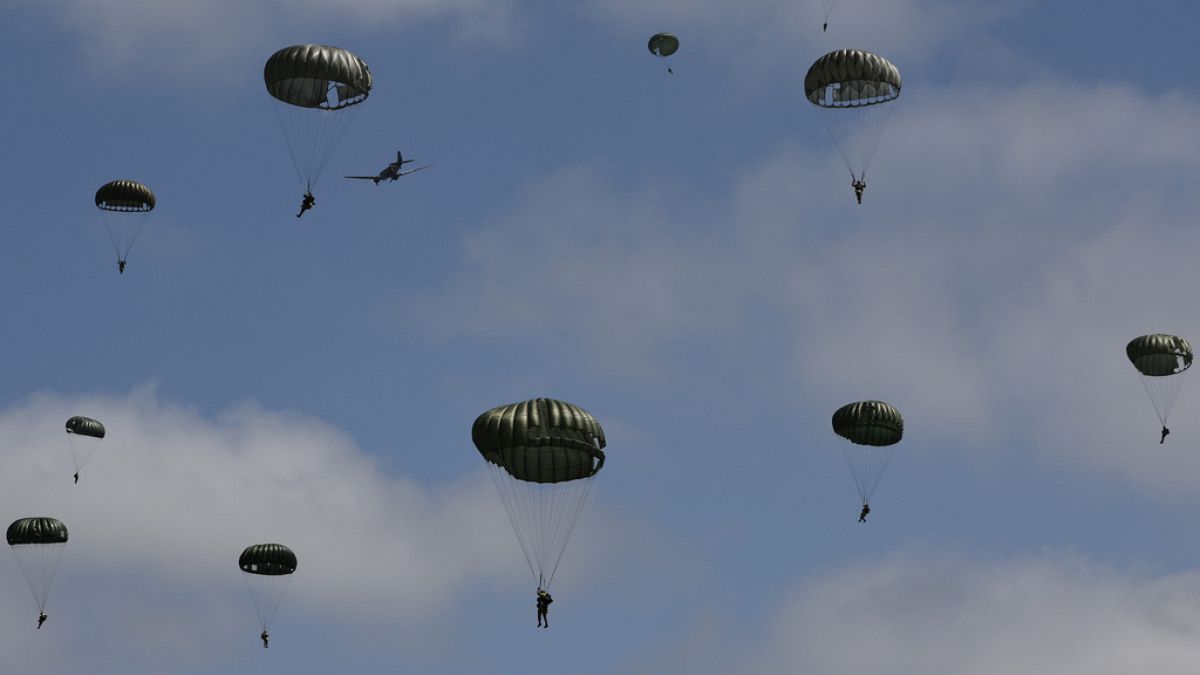Both U.S. President Joe Biden and Ukrainian President Volodymr Zelenskyy attended whilst Russian President Vladimir Putin was not invited.
The visual spectacle near the village of Carentan-Les-Marais heralded a week of ceremonies for the fast-disappearing generation of Allied troops who fought from D-Day beaches 80 years ago to Adolf Hitler’s fall, helping free Europe from his tyranny.
All along the Normandy coastline — where then-young soldiers from across the United States, Britain, Canada and other Allied nations waded ashore through hails of fire on five beaches on June 6, 1944 — French officials, grateful Normandy survivors and other admirers are saying “merci” but also goodbye.
The ever-dwindling number of veterans in their late nineties and older who are coming back to remember fallen friends and their history-changing exploits are the last.
Part of the purpose of fireworks shows, parachute jumps, solemn commemorations and ceremonies that world leaders will attend this week is to pass the baton of remembrance to the current generations now seeing war again in Europe, in Ukraine.
On Sunday, three C-47 transport planes, a workhorse of the war, dropped three long strings of jumpers, their round chutes mushrooming open in the blue skies with puffy white clouds, to whoops from the huge crowd that was regaled by tunes from Glenn Miller and Edith Piaf as they waited.
Russia’s President Putin not invited
U.S. President Joe Biden and Ukrainian President Volodymr Zelenskyy both attended for the D-Day events.
But Vladimir Putin did not.
Organisers confirmed back in April that the Russian president would not be invited to any commemorative events, due to the country’s ongoing invasion of Ukraine.
During a press briefing on Thursday, a representative of the French presidency confirmed Russia’s absence, suggesting the mere suggestion was stoking tensions between France and allied nations.
“Russia has not been invited. The conditions for its participation are not there given the war of aggression launched in February 2022, which has only increased these last weeks,” they said.
There have also been reports that a number of EU member states had said they would have felt “uneasy” if Putin was allowed to attend.
Also the International Criminal Court has issued a warrant for Russian President Vladimir Putin on charges of responsibility for the abductions of children from Ukraine.
Some Russian representatives were allowed access though, in order to recognise the country’s war-time sacrifice.
More than 150,000 Allied troops launched the air, sea and land D-Day landings in Normandy in 1944. It eventually led to the liberation of western Europe from Nazi Germany.
The then-Soviet Union lost over 25 million lives in what it calls the ‘Great Patriotic War’.
The Kremlin marks that victory with an annual military parade on Red Square in Moscow.
Aging veterans remember those who died
Dozens of World War II veterans converged on France to revisit old memories, make new ones, and hammer home a message that survivors of D-Day and the ensuing Battle of Normandy, and of other World War II theatres, have repeated time and time again — that war is hell.
“Seven thousand of my marine buddies were killed. Twenty thousand shot up, wounded, put on ships, buried at sea,” said Don Graves, a U.S. Marine Corps veteran who served in Iwo Jima in the Pacific theatre.
“I want the younger people, the younger generation here to know what we did,” said Graves, part of a group of more than 60 World War II veterans who flew into Paris on Saturday.
The youngest veteran in the group is 96 and the most senior 107, according to their carrier from Dallas, American Airlines.
“We did our job and we came home and that’s it. We never talked about it I think. For 70 years I didn’t talk about it,” said another of the veterans, Ralph Goldsticker, a U.S. Air Force captain who served in the 452nd Bomb Group.
Of the D-Day landings, he recalled seeing from his aircraft “a big, big chunk of the beach with thousands of vessels,” and spoke of bombing raids against German strongholds and routes that German forces might otherwise have used to rush in reinforcements to push the invasion back into the sea.
“I dropped my first bomb at 06:58 a.m. in a heavy gun placement,” he said. “We went back home, we landed at 09:30. We reloaded.”

